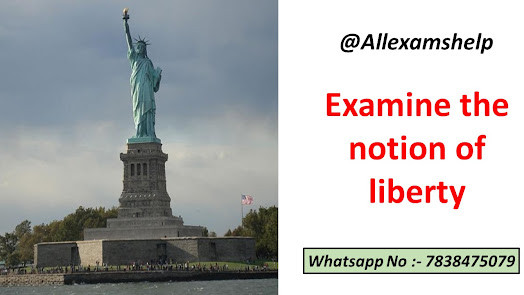The notion of liberty is a complex and multifaceted concept that has been debated and explored by philosophers, political theorists, and activists throughout history. At its core, liberty is the idea that individuals have the freedom to act, speak, and think as they choose, without undue interference or coercion from others. This includes both negative liberty, which is the absence of external constraints or interference, and positive liberty, which is the ability to exercise one's own agency and pursue one's own goals.
Examine the notion of
liberty
The concept of
liberty has been enshrined in various documents, including the United States
Declaration of Independence, which states that all individuals are endowed with
certain "unalienable rights," including life, liberty, and the
pursuit of happiness. Similarly, the Universal Declaration of Human Rights
recognizes the right to freedom of thought, conscience, and religion, as well
as the right to freedom of opinion and expression.
However, the
idea of liberty is not without its limitations and complexities. For example,
some argue that certain forms of speech or behavior can harm others or threaten
public safety, and therefore may need to be regulated or curtailed.
Additionally, the exercise of individual liberty can sometimes conflict with
the rights and freedoms of others, leading to questions of how to balance
competing interests.
Overall, the
concept of liberty is a fundamental component of many political and social
systems, and has been a driving force behind numerous social movements throughout
history. While the notion of liberty is far from a settled or universally
agreed-upon concept, it remains an important topic of discussion and debate in
modern society.
The notion of
liberty refers to the freedom of individuals to act, think, and speak as they
choose without unnecessary external constraints. It is a concept that has been
at the core of many political and social movements throughout history, and is
closely associated with the idea of individual rights and freedoms.
There are
different types of liberty, including negative and positive liberty. Negative
liberty refers to the absence of external constraints or interference that
would limit an individual's ability to act, think, or speak. Positive liberty,
on the other hand, refers to an individual's capacity to exercise their own
agency and pursue their own goals, and is often associated with the provision
of resources and opportunities that enable individuals to do so.
The notion of
liberty has been enshrined in many legal and political documents, such as the
United States Constitution and the Universal Declaration of Human Rights. These
documents recognize the importance of protecting individual liberty as a fundamental
component of a just and fair society.
For SOLVED PDF & Handwritten
WhatsApp No :- 7838475019
However, the
concept of liberty is not without its limitations and challenges. For example,
some argue that certain forms of speech or behavior may harm others or threaten
public safety, and may therefore need to be regulated or curtailed in the
interest of the common good. Additionally, the exercise of individual liberty
can sometimes come into conflict with the rights and freedoms of others,
raising difficult questions about how to balance competing interests.
Overall, the
notion of liberty remains an important and complex topic of discussion and
debate in modern society, and is likely to continue to be so for the
foreseeable future.
